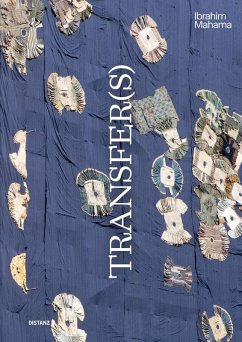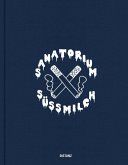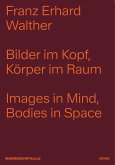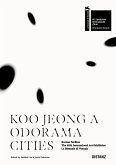Verstrickungen von Kolonialgeschichte und Textilhandel
Anlässlich des Jubiläums 375 Jahre Westfälischer Frieden widmet sich der international renommierte Künstler Ibrahim Mahama (geb. 1987 in Tamale, Ghana; lebt und arbeitet in Accra, Kumasi und Tamale, Ghana) der Geschichte der Stadt Osnabrück als Produktions- und Handelsstandort für Textilien, insbesondere Leinen. Leinen wurde nicht nur als Rohstoff verkauft, sondern verwendet, um Kleidung für Zwangsarbeiter_innen auf Plantagen der Westindischen Inseln herzustellen. Außerdem fungierte es als Tauschmittel für Gefangene aus den Küstenregionen des afrikanischen Kontinents. Mahamas Forschungs- und Ausstellungsprojekt untersucht diese vertrackten und im Schatten des Kolonialismus installierten Transferkreisläufe zwischen Mitteleuropa und Westafrika. Dazu verhüllte der ghanaische Künstler das ehemalige Galeria-Kaufhof-Gebäude in der Osnabrücker Innenstadt mit handgewebten Baumwollstoffen und recycelten Jutesäcken: Lokale Stadtgeschichte, Kriegs- und Nachkriegserfahrungen werden durch Mahamas Intervention in den Kontext globaler Handels- und Machtverhältnisse gestellt.
Die Publikation dokumentiert die Installation TRANSFER(S), die im öffentlichen Raum in Osnabrück gezeigt wurde, sowie das Symposium in Tamale, Ghana, das als zweiter Teil des Projektes stattfand. Mit Beiträgen von Akosua Adomako Ampofo, Bernard Akoi-Jackson, Isaac Gyasi, Thorsten Heese, Priscilla Kennedy, Bettina Klein, Koliko, Ibrahim Mahama, , Kwasi Ohene-Ayeh, Zohra Opoku and The Revival, Gabriel Schimmeroth, karî'k chä seid' u und Klaus Weber.
Entanglements between Colonial History and the Textile Trade
On occasion of the 375th anniversary of the Peace of Westphalia, the internationally renowned artist Ibrahim Mahama (b. Tamale, Ghana, 1987; lives and works in Accra, Kumasi, and Tamale, Ghana) delves into the history of the city of Osnabrück as a center of the production of and trade in textiles, especially linen. Linen was not only sold as a raw material, but also used to manufacture apparel for forced laborers on plantations in the West Indies. And it served as a medium of exchange for prisoners from the coastal regions of the African continent. Mahama's research and exhibition project analyzes these intricate cycles of transfer connecting Central Europe and Western Africa that were installed in the shadow of colonialism. The Ghanaian artist wrapped the former Galeria Kaufhof department store building in downtown Osnabrück in handwoven cotton fabrics and recycled jute bags: zooming out from local history and the experiences of war and the postwar period, Mahama's intervention embeds them in the context of global trade relations and power structures.
The publication documents the installation TRANSFER(S), which was on public view in Osnabrück, as well as the project's second part, a symposium held in Tamale, Ghana. With writings by Akosua Adomako Ampofo, Bernard Akoi-Jackson, Isaac Gyasi, Thorsten Heese, Priscilla Kennedy, Bettina Klein, Koliko, Ibrahim Mahama, Kwasi Ohene-Ayeh, Zohra Opoku and The Revival, Gabriel Schimmeroth, karî'k chä seid' u, and Klaus Weber.
Anlässlich des Jubiläums 375 Jahre Westfälischer Frieden widmet sich der international renommierte Künstler Ibrahim Mahama (geb. 1987 in Tamale, Ghana; lebt und arbeitet in Accra, Kumasi und Tamale, Ghana) der Geschichte der Stadt Osnabrück als Produktions- und Handelsstandort für Textilien, insbesondere Leinen. Leinen wurde nicht nur als Rohstoff verkauft, sondern verwendet, um Kleidung für Zwangsarbeiter_innen auf Plantagen der Westindischen Inseln herzustellen. Außerdem fungierte es als Tauschmittel für Gefangene aus den Küstenregionen des afrikanischen Kontinents. Mahamas Forschungs- und Ausstellungsprojekt untersucht diese vertrackten und im Schatten des Kolonialismus installierten Transferkreisläufe zwischen Mitteleuropa und Westafrika. Dazu verhüllte der ghanaische Künstler das ehemalige Galeria-Kaufhof-Gebäude in der Osnabrücker Innenstadt mit handgewebten Baumwollstoffen und recycelten Jutesäcken: Lokale Stadtgeschichte, Kriegs- und Nachkriegserfahrungen werden durch Mahamas Intervention in den Kontext globaler Handels- und Machtverhältnisse gestellt.
Die Publikation dokumentiert die Installation TRANSFER(S), die im öffentlichen Raum in Osnabrück gezeigt wurde, sowie das Symposium in Tamale, Ghana, das als zweiter Teil des Projektes stattfand. Mit Beiträgen von Akosua Adomako Ampofo, Bernard Akoi-Jackson, Isaac Gyasi, Thorsten Heese, Priscilla Kennedy, Bettina Klein, Koliko, Ibrahim Mahama, , Kwasi Ohene-Ayeh, Zohra Opoku and The Revival, Gabriel Schimmeroth, karî'k chä seid' u und Klaus Weber.
Entanglements between Colonial History and the Textile Trade
On occasion of the 375th anniversary of the Peace of Westphalia, the internationally renowned artist Ibrahim Mahama (b. Tamale, Ghana, 1987; lives and works in Accra, Kumasi, and Tamale, Ghana) delves into the history of the city of Osnabrück as a center of the production of and trade in textiles, especially linen. Linen was not only sold as a raw material, but also used to manufacture apparel for forced laborers on plantations in the West Indies. And it served as a medium of exchange for prisoners from the coastal regions of the African continent. Mahama's research and exhibition project analyzes these intricate cycles of transfer connecting Central Europe and Western Africa that were installed in the shadow of colonialism. The Ghanaian artist wrapped the former Galeria Kaufhof department store building in downtown Osnabrück in handwoven cotton fabrics and recycled jute bags: zooming out from local history and the experiences of war and the postwar period, Mahama's intervention embeds them in the context of global trade relations and power structures.
The publication documents the installation TRANSFER(S), which was on public view in Osnabrück, as well as the project's second part, a symposium held in Tamale, Ghana. With writings by Akosua Adomako Ampofo, Bernard Akoi-Jackson, Isaac Gyasi, Thorsten Heese, Priscilla Kennedy, Bettina Klein, Koliko, Ibrahim Mahama, Kwasi Ohene-Ayeh, Zohra Opoku and The Revival, Gabriel Schimmeroth, karî'k chä seid' u, and Klaus Weber.

